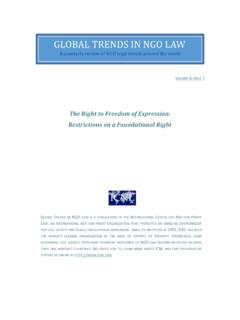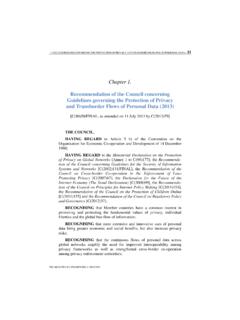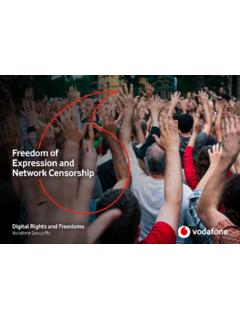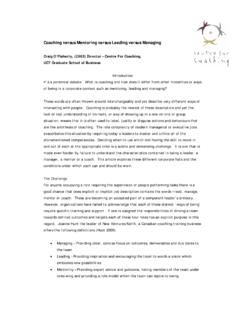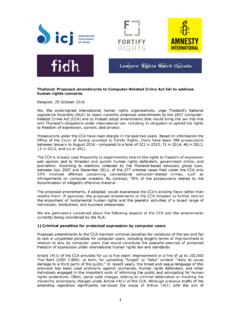Transcription of Restricting Freedom of Expression: Standards and ...
1 Restricting Freedom of expression : Standards and Principles Background Paper for Meetings Hosted by the UN Special Rapporteur on Freedom of Opinion and expression By Toby Mendel Executive Director Centre for Law and Democracy toby@law I. Introduction It is universally acknowledged that the right to Freedom of expression is a foundational human right of the greatest importance. It is a lynchpin of democracy, key to the protection of all human rights, and fundamental to human dignity in its own right. At the same time, it is also universally recognised that it is not an absolute right, and every democracy has developed some system of limitations on Freedom of expression .
2 International law does provide for a general three part test for assessing restrictions on Freedom of expression , and this test has been elaborated on in numerous judgments by international courts tasked with oversight of international human rights treaties. National courts, often interpreting constitutional guarantees which are based on or are similar to international guarantees, have also helped elaborate the precise meaning of the test for restrictions on Freedom of expression . Assessing restrictions on Freedom of expression , however, is an extremely complex matter. There are several reasons for this, including that the primary guarantee of Freedom of expression is itself multifaceted, that the grounds for Restricting Freedom of expression or interests which such restrictions aim to protect are numerous, 2 and that the contexts in which the need for restrictions is asserted are almost limitless.
3 This Paper provides an overview of the key issues relating to restrictions on Freedom of expression , describing how international and in some cases national courts have approached them. It also highlights some problem areas or issues which remain unclear or which lack sufficient elaboration. For these, it poses questions which might be considered by participants at the two meetings for which the Paper serves as background material. It does not, on the other hand, elaborate on specific areas of restrictions such as defamation law, media regulation and protection of national security. To do justice to these issues would require a full length book.
4 II. The Right to Freedom of expression The right to Freedom of expression is guaranteed in very similar terms by both Article 19 of the Universal Declaration on Human Rights (UDHR),1 a UN General Assembly resolution, and Article 19(2) of International Covenant on Civil and Political Rights (ICCPR),2 a formally binding legal treaty ratified by 165 The latter states: Everyone shall have the right to Freedom of expression ; this right shall include Freedom to seek, receive and impart information and ideas of all kinds, regardless of frontiers, either orally, in writing or in print, in the form of art or through any other media of his choice. All of the three regional human rights treaties the European Convention on Human Rights (ECHR),4 the American Convention on Human Rights (ACHR)5 and the African Charter on Human and Peoples Rights (ACHPR)6 guarantee the right to Freedom of expression , respectively at Article 10, Article 9 and Article 13.
5 These guarantees are largely similar to those found in the ICCPR. It is not disputed that Freedom of expression is a right of the greatest importance. At its very first session in 1946 the United Nations General Assembly declared: Freedom of information is a fundamental human right and .. the touchstone of all the freedoms to which the United Nations is Regional courts and other bodies, as well as national courts around the world, have 1 United Nations General Assembly Resolution 217A (III), 10 December 1948. 2 UN General Assembly Resolution 2200 A (XXI), 16 December 1966, entered into force 23 March 1976. 3 As of March 2010.
6 4 Adopted 4 November 1950, entered into force 3 September 1953. 5 Adopted 22 November 1969, entered into force 18 July 1978. 6 Adopted 26 June 1981, entered into force 21 October 1986. 7 Resolution 59(1), 14 December 1946. The term Freedom of information as used here was meant in its broadest sense as the overall free flow of information and ideas in society, or Freedom of expression . 3 reaffirmed this. For example, the Inter American Court of Human Rights has stated: Freedom of expression is a cornerstone upon which the very existence of a democratic society The European Court of Human Rights has noted: [F]reedom of expression constitutes one of the essential foundations of [a democratic] society, one of the basic conditions for its progress and for the development of every And the African Commission on Human and Peoples Rights has indicated, in respect of Article 9 of the African Convention.
7 This Article reflects the fact that Freedom of expression is a basic human right, vital to an individual s personal development, his political consciousness, and participation in the conduct of the public affairs of his At the same time, Freedom of expression is not absolute and every system of law provides for some limitations on it. Article 19(3) of the ICCPR provides: The exercise of the rights provided for in paragraph 2 of this article carries with it special duties and responsibilities. It may therefore be subject to certain restrictions, but these shall only be such as are provided by law and are necessary: (a) For respect of the rights or reputations of others; (b) For the protection of national security or of public order (ordre public), or of public health or morals.
8 This has been interpreted as meaning that only restrictions which meet a strict three part test are considered to be legitimate (see below).11 International guarantees of the right to Freedom of expression have a number of key features. First, opinions are absolutely protected by Article 19(1) of the ICCPR. Technically, of course, opinions are not expressions. But it is significant that they are afforded absolute protection. This means that it is permissible to think the most evil and depraved thoughts, although giving expression to them may legitimately warrant a sanction. Second, the right applies to everyone . It must be protected without distinction of any kind, such as race, colour, sex, language, religion, political or other opinion, national or social origin, property, birth or other status.
9 12 8 Compulsory Membership in an Association Prescribed by Law for the Practice of Journalism, Advisory Opinion OC-5/85 of 13 November 1985, Series A, No. 5, para. 70. 9 Handyside v. United Kingdom, 7 December 1976, Application No. 5493/72, 1 EHRR 737, para. 49. 10 Media Rights Agenda and Others v. Nigeria, 31 October 1998, Communication Nos. 105/93, 130/94, 128/94 and 152/96, para. 52. 11 See, Mukong v. Cameroon, 21 July 1994, Communication No. 458/1991, para. (UN Human Rights Committee). 4 Third, it applies to information and ideas of any kind. As the UN Human Rights Committee, the body of experts tasked with overseeing compliance with the ICCPR, has indicated, this includes any information or ideas which may be communicated: Article 19, paragraph 2, must be interpreted as encompassing every form of subjective ideas and opinions capable of transmission to It also includes factually incorrect statements, opinions which appear to lack any merit, and even offensive statements.
10 As the European Court of Human Rights has noted: It matters little that [an] opinion is a minority one and may appear to be devoid of merit since .. it would be particularly unreasonable to restrict Freedom of expression only to generally accepted ideas. 14 Fourth, protection is also wide in terms of the manner in which a communication is disseminated. This is signalled by the phrase through any other media of his choice in Article 19(2) of the ICCPR as well as the term capable of transmission to others in the quote from the Human Rights Committee above. The manner of dissemination, as well as the form of the expression , has often been taken into account by international courts when assessing the legitimacy of a restriction.

